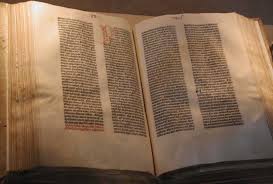Family Bibles and Personal History: A Spiritual Heritage
 When I recently learned that October is National Bible Month, it prompted me to explore the historical relevance of the Bible not only within the United States, but also on a more personal level. The Bible has a long and important history within the United States, particularly within our government and judicial system. The Founding Fathers based the U.S. Constitution on the principles of the Bible. Every U.S. president except one (Theodore Roosevelt, during his first inauguration in 1901 at the home of Mr. Ansley Wilcox following the assassination of President William McKinley) has been sworn into office with a Bible, usually opened to a page containing a meaningful verse. And throughout the history of our country, individuals – prior to testifying in a U.S. court of law – swear to tell the whole truth and nothing but the truth as they raise their right hand and place their left hand on the Holy Bible.
When I recently learned that October is National Bible Month, it prompted me to explore the historical relevance of the Bible not only within the United States, but also on a more personal level. The Bible has a long and important history within the United States, particularly within our government and judicial system. The Founding Fathers based the U.S. Constitution on the principles of the Bible. Every U.S. president except one (Theodore Roosevelt, during his first inauguration in 1901 at the home of Mr. Ansley Wilcox following the assassination of President William McKinley) has been sworn into office with a Bible, usually opened to a page containing a meaningful verse. And throughout the history of our country, individuals – prior to testifying in a U.S. court of law – swear to tell the whole truth and nothing but the truth as they raise their right hand and place their left hand on the Holy Bible.
Occasionally, particular Bibles become historically significant. Consider, for example, the Durant Bible at the University of North Carolina at Chapel Hill. It was recently used as the Bible for the installation ceremony of the new chancellor, but its importance as a historical artifact is also signified by the steps taken to preserve the 414-year-old volume (see http://www.unc.edu/campus-updates/installation-durant-bible/).
In addition to government and higher education, a Bible can also play an important role in personal and/or family history. The scriptures within the Bible provide multiple genealogies, the most important being that of Jesus, and so it can be assumed that is why publishers initiated and maintained the custom of providing family tree charts in the front matter of most Bibles. Old Bibles typically feature several pages of ornate, beautifully drawn charts upon which a beloved family member painstakingly recorded – using flowing, cursive handwriting – the names and dates of births, marriages and deaths within the family. Many individuals possess an ancestor’s Bible, and often treasure it for the genealogical record that it provides, particularly when multiple generations diligently updated the information. This one-of-a-kind handwritten document is so important to some family members that it can become a point of contention when distributing a deceased relative’s personal effects, and can cause emotional distress when a family Bible becomes lost or damaged. In fact, there is at least one Internet search board that helps reunite individuals with their family Bibles; visit http://www.rootschat.com/forum/index.php?board=155.0
As important as the genealogical record is, I believe that there are other valuable connections between a family’s Bible and personal history. Simply remembering the appearance of the family Bible and how relatives used it can be relevant. For example, my great-grandmother read her Bible daily. It was a small, white, soft-leather Bible with gilt-edged pages and it had her full name monogrammed on the front in gold lettering. Although she kept it on her bedroom dresser, she always took it into the living room to read it in the comfort of her recliner (although I don’t ever remember her reclining while reading). Advanced in years, she often dozed off after awhile, almost always with one of her hands resting on the Bible’s open pages. As a child, I didn’t think much of her devotional time, but as an adult, I now understand that she helped to shape my spiritual journey by showing the importance of daily Bible reading.
I wish that I possessed my great-grandmother’s Bible. I know that she recorded our family tree within its pages, but I don’t recall if she made notes in the margins of scripture. Many people have told me how important their family Bible is to them because of loved ones’ notations regarding a particular passage or verse. Those scribbled marginal notes benefit my friends’ understanding of the scriptures and simultaneously give them insight to the spiritual struggles and victories within the lives of their ancestors.
Whether or not you currently own a family Bible, it is important to recognize that you can begin your own. Not only can you preserve your family’s genealogy, but you can also contribute to your family’s spiritual heritage.


